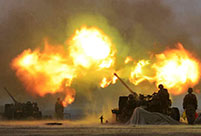 Top 100 beauties in the world!
Top 100 beauties in the world!
 Gallery: Who is the most beautiful one?
Gallery: Who is the most beautiful one?
 If you like autumn, put your hands in the air!
If you like autumn, put your hands in the air!
 Fan Bingbing's "Queen style" in new play
Fan Bingbing's "Queen style" in new play
 Lingerie show at 2014 Miss China
Lingerie show at 2014 Miss China
 J-10 fighters show aerobatic stunts in smog-free sky
J-10 fighters show aerobatic stunts in smog-free sky
 Charming contestants of Shanghai Int’l Model Contest
Charming contestants of Shanghai Int’l Model Contest
 Most amazing chi-pao beauties
Most amazing chi-pao beauties
 7 deadly animal attacks
Russia to launch 70 Proton rockets by 2020: official
7 deadly animal attacks
Russia to launch 70 Proton rockets by 2020: officialSHIJIAZHUANG, Nov. 18 -- Authorities in north China's largest steel producing region have unveiled a plan to transfer excess capacity of its heavy industries abroad by 2023.
Hebei Province in north China aims to move production of 5 million tonnes of steel, 5 million tonnes of cement and 3 million weight boxes (a weight box equals roughly 50 kg) of glass overseas by 2017.
The goal is more ambitious for the period leading up to 2023.
By 2023, Hebei will seek to shift production of 20 million tonnes of steel, 30 million tonnes of cement and 10 million weight boxes of glass capacity.
The initiative comes at a time when local steel, cement and glass producers are struggling, with sluggish growth in the world's second-largest economy crippling demand for their products. In many cases, it has led to severe overcapacity.
Yu Yong, chairman of Hebei Iron and Steel Group, said steel makers should make changes to cope with weak domestic demand and low profit margins.
On Tuesday, Hebei Iron and Steel signed a deal for a substantial increase in its stake in the Swiss-based steel trader Duferco International Trading Holding, achieving a majority 51 percent.
The trader will help Hebei Iron and Steel better understand global demand and help it relocate production capacity around the world, said Yu.
According to the plan, the government will offer preferential policies, including rewards, to encourage local steel companies to develop iron ore mines and set up steel mills in regions including the Southeast Asia, West Asia and Africa.
In September, Hebei Iron and Steel signed an agreement to build a 5-million-tonne steel firm in South Africa. It planned to develop the base into a business with an annual sales revenue of 10 billion U.S. dollars within three years.
Meanwhile, the local government will encourage cement and glass producers to establish subsidiaries or joint ventures in regions like Africa, Southeast Asia, South America and the Central and East Europe to meet local demand.
Hebei is a major source of industrial pollutants blamed for the notorious choking smog that often spreads to neighboring regions like Beijing.
The smog, a serious public health concern, has prompted the authorities to rethink and change the growth model and to take more stringent measures to fight pollution.
Hebei's economy is dominated by high polluting and energy-guzzling heavy industries, which contribute up to 77 percent of all emissions into the air, official data showed.
It has the largest steel capacity of all China's regions, at approximately 200 million tonnes, or one fourth of the country's total.
The local government has pledged to cut annual steel and cement production capacities by 60 million tonnes and glass capacity by 36 million weight boxes by 2017.
It also sought to reduce annual coal consumption by 40 million tonnes from 2012 levels within the same time frame.
 Hot girls at motor show
Hot girls at motor show  Official trailer of Y-20
Official trailer of Y-20 Photos: Xi Jinping in Fujian
Photos: Xi Jinping in Fujian Standard faces for each countries
Standard faces for each countries China-made military transport aircraft gets ready
China-made military transport aircraft gets ready World Pole Dance Championship in China
World Pole Dance Championship in China Shocking! Photos of Chinese fighters revealed
Shocking! Photos of Chinese fighters revealed 59-year-old Liu Xiaoqing still looks stunning
59-year-old Liu Xiaoqing still looks stunning  In pics: PLA stages live-fire drill in NE China
In pics: PLA stages live-fire drill in NE China  Top 10 most dangerous jobs in the world
Top 10 most dangerous jobs in the world  Top 10 fifth generation jet fighters in the world
Top 10 fifth generation jet fighters in the world Top 10 Chinese goddesses
Top 10 Chinese goddesses  Top 20 hottest women in the world in 2014
Top 20 hottest women in the world in 2014 Top 10 pure beauties in showbiz
Top 10 pure beauties in showbiz  Top 10 world's highest-paid models 2014
Top 10 world's highest-paid models 2014 The most gorgeous Chinese women
The most gorgeous Chinese women Top 10 most handsome faces in Asia
Top 10 most handsome faces in AsiaDay|Week|Month